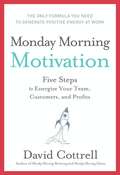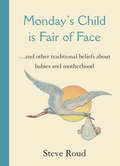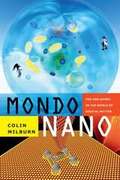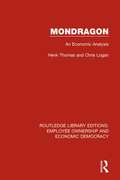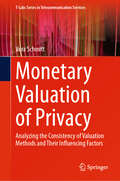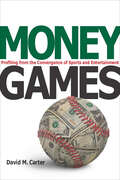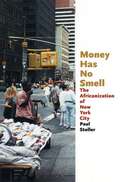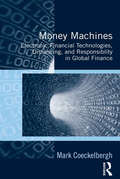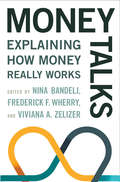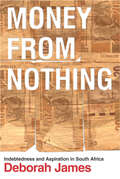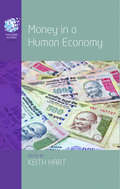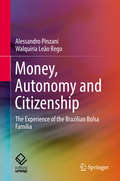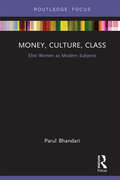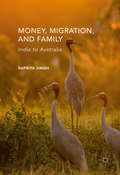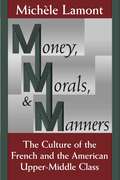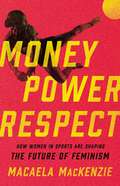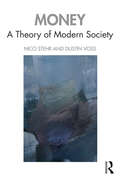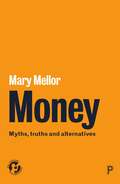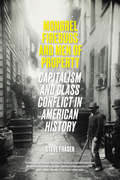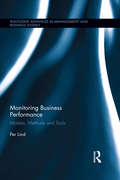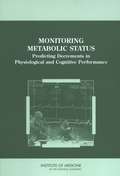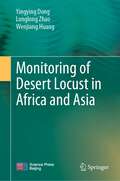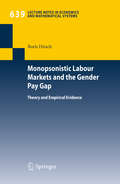- Table View
- List View
Monday Morning Motivation
by David CottrellHow to generate the positive energy found in successful organizations What is organizational energy? According to internationally recognized leadership coach David Cottrell, it is not short-term enthusiasm for the latest corporate program-of-the-week. Instead, it is grounded in something much deeper--a solid commitment to an organization, its mission, and its values. When used positively, organizational energy strengthens and solidifies personal motivation, producing an unshakable desire to achieve bigger and better results. It is a precious resource your organization cannot afford to be without. In Monday Morning Motivation, Cottrell takes inspiration from Einstein's famous equation E=mc2 to provide a step-by-step strategy you can use to access your organization's energy reservoir (E) and accelerate your people (m) to the next level of performance. Specifically, he reveals the vital conductors of energy (c) that you need to motivate your team and customers--synchronization, speed, communication, customer passion, and integrity--and expertly demonstrates the effect that your leadership style (2) has on the effectiveness of these conductors. Fortunately you don't need to be Einstein to learn and apply these principles to your organization. You just need one hour each week for ten weeks to consider Cottrell's helpful discussion questions and determine what you can do right now to become a better leader and motivator. If you do, you will launch your organization to greater results and a whole new stratosphere of job satisfaction.
Monday's Child is Fair of Face: and Other Traditional Beliefs about Babies and Motherhood
by Steve RoudPregnancy and childbirth remains a mystical and magical time, characterised by feelings of hope, uncertainty and worry. No matter how many scientific innovations come along, there's still room for home-grown beliefs and traditions handed down through the family. Couples buying a pram may still ask for it to be delivered after the birth, and some grandparents will shrink from tickling the baby's feet in case it grows up to have a stammer. Monday's Child is Fair of Face gathers together these beliefs and customs, explaining how and why they arose, in which parts of the country they have been particularly popular, and to what extent they survive today. Arranged thematically, it's the perfect book to dip into, and its mixture of familiar, unfamiliar and frankly bizarre beliefs makes for compelling reading.
Mondo Nano: Fun and Games in the World of Digital Matter
by Colin MilburnIn Mondo Nano Colin Milburn takes his readers on a playful expedition through the emerging landscape of nanotechnology, offering a light-hearted yet critical account of our high-tech world of fun and games. This expedition ventures into discussions of the first nanocars, the popular video games Second Life, Crysis, and BioShock, international nanosoccer tournaments, and utopian nano cities. Along the way, Milburn shows how the methods, dispositions, and goals of nanotechnology research converge with video game culture. With an emphasis on play, scientists and gamers alike are building a new world atom by atom, transforming scientific speculations and video game fantasies into reality. Milburn suggests that the closing of the gap between bits and atoms entices scientists, geeks, and gamers to dream of a completely programmable future. Welcome to the wild world of Mondo Nano.
Mondragon: An Economic Analysis (Routledge Library Editions: Employee Ownership and Economic Democracy #14)
by Chris Logan Henk ThomasThis book, first published in 1982, summarises the history and organisation of the group of co-operatives centred in Mondragon. The study makes an in-depth analysis of its economic aspects, including employment creation and manpower planning, the raising of financial resources and planning of investments, problems of earnings differentials, and the incentives that can be derived from worker-ownership. In particular, the authors examine the operation of the self-management system and Mondragon’s production efficiently.
Monetary Valuation of Privacy: Analyzing the Consistency of Valuation Methods and Their Influencing Factors (T-Labs Series in Telecommunication Services)
by Vera SchmittThis book explores the complex domain of personal data valuation, uncovering how individuals perceive the worth of their privacy in an era dominated by digital information exchange. The book delves into the largely scattered empirical research domain of how users value their own data, analyzing how companies like Google and Facebook rely heavily on the continuous collection of personal data to run their business models. By examining concepts like ‘Willingness to Pay’ and ‘Willingness to Accept’ in the context of privacy, the book offers a comprehensive overview of how people navigate the often-ambiguous trade-offs between sharing personal information and safeguarding their privacy. Through an empirical analysis supported by 14 crowdsourcing and two field experiments, the author investigates the influence of various factors—such as Privacy Concerns, Privacy Behavior, and Privacy Literacy—on the monetary assessment of privacy. The book also contrasts different methodological approaches to determine which yields the most reliable results, shedding light on the behavioral biases that can skew data valuation. This book is ideal for anyone interested in the intersection of privacy, economics, and digital ethics. The author not only offers insights into the current landscape but also proposes robust models for understanding and predicting how people value their privacy in different contexts. Whether you are a researcher, policymaker, or simply a concerned digital citizen, this book provides valuable perspectives on the monetization of personal data and the future of privacy in the digital age.
Money Games: Profiting from the Convergence of Sports and Entertainment
by David M. CarterThe businesses behind Dubai Sports City, the branding of David Beckham, and the presence and popularity of fantasy sports leagues on the internet are unmistakable indicators that the sports and the entertainment industries are quickly becoming one and the same. But, you needn't travel far or be a hard core sports fan to appreciate this fact. Whether you play Madden NFL on the Wii, use Nike+ along with your iPod to monitor your workouts, or channel surf and take note of the number of athlete-driven commercials, evidence of this transformation is ubiquitous in today's sports viewing and consuming experience. In recent years, the rapid convergence of sports and entertainment has been key to the sports business industry's continued growth and financial success. Money Gamesnot only analyzes how industry stakeholders have monetized this convergence, but also provides readers with answers to this core question: how can the sports business continue to profit from the blurring of sports and entertainment? Author David M. Carter considers a wide array of implications for television content, video gaming, athlete branding, the Internet, mobile technology, gambling, sports-anchored real estate development, venue technology, and corporate marketing-in short, those areas where business opportunities exist now that sports and entertainment have become one. Money Gamesis a must-read for professionals and future leaders of the sports and entertainment industries, and sports fans will also find an intriguing story about the evolution of the games that they cherish and follow.
Money Has No Smell: The Africanization of New York City
by Paul StollerIn February 1999 the tragic New York City police shooting of Amadou Diallo, an unarmed street vendor from Guinea, brought into focus the existence of West African merchants in urban America. In Money Has No Smell, Paul Stoller offers us a more complete portrait of the complex lives of West African immigrants like Diallo, a portrait based on years of research Stoller conducted on the streets of New York City during the 1990s. Blending fascinating ethnographic description with incisive social analysis, Stoller shows how these savvy West African entrepreneurs have built cohesive and effective multinational trading networks, in part through selling a simulated Africa to African Americans. These and other networks set up by the traders, along with their faith as devout Muslims, help them cope with the formidable state regulations and personal challenges they face in America. As Stoller demonstrates, the stories of these West African traders illustrate and illuminate ongoing debates about globalization, the informal economy, and the changing nature of American communities.
Money Machines: Electronic Financial Technologies, Distancing, and Responsibility in Global Finance
by Mark CoeckelberghWhile we have become increasingly vulnerable to the ebb and flow of global finance, most of us know very little about it. This book focuses on the role of technology in global finance and reflects on the ethical and societal meaning and impact of financial information and communication technologies (ICTs). Exploring the history, metaphysics, and geography of money, algorithms, and electronic currencies, the author argues that financial ICTs contribute to impersonal, disengaged, placeless, and objectifying relations, and that in the context of globalization these 'distancing' effects render it increasingly difficult to exercise and ascribe responsibility. Caught in the currents of capital, it seems that both experts and lay people have lost control and lack sufficient knowledge of what they are doing. There is too much epistemic, social, and moral distance. At the same time, the book also shows that these electronically mediated developments do not render global finance merely 'virtual', for its technological practices remain material and place-bound, and the ethical and social vulnerabilities they create are no less real. Moreover, understood in terms of technological practices, global finance remains human through and through, and there is no technological determinism. Therefore, Money Machines also examines the ways in which contemporary techno-financial developments can be resisted or re-oriented in a morally and socially responsible direction - not without, but with technology. As such, it will appeal to philosophers and scholars across the humanities and the social sciences with interests in science and technology, finance, ethics and questions of responsibility.
Money Talks: Explaining How Money Really Works
by Viviana A. Zelizer Nina Bandelj Frederick F. WherryThe world of money is being transformed as households and organizations face changing economies, and new currencies and payment systems like Bitcoin and Apple Pay gain ground. What is money, and how do we make sense of it? Money Talks is the first book to offer a wide range of alternative and unexpected explanations of how social relations, emotions, moral concerns, and institutions shape how we create, mark, and use money. This collection brings together a stellar group of international experts from multiple disciplines—sociology, economics, history, law, anthropology, political science, and philosophy—to propose fresh explanations for money's origins, uses, effects, and future. Money Talks explores five key questions: How do social relationships, emotions, and morals shape how people account for and use their money? How do corporations infuse social meaning into their financing and investment practices? What are the historical, political, and social foundations of currencies? When does money become contested, and are there things money shouldn't buy? What is the impact of the new twenty-first-century currencies on our social relations?At a time of growing concern over financial inequality, Money Talks overturns conventional views about money by revealing its profound social potential.
Money from Nothing: Indebtedness and Aspiration in South Africa
by Deborah JamesMoney from Nothing explores the dynamics surrounding South Africa's national project of financial inclusion#151;dubbed "banking the unbanked"#151;which aimed to extend credit to black South Africans as a critical aspect of broad-based economic enfranchisement. Through rich and captivating accounts, Deborah James reveals the varied ways in which middle- and working-class South Africans' access to credit is intimately bound up with identity, status-making, and aspirations of upward mobility. She draws out the deeply precarious nature of both the aspirations and the economic relations of debt which sustain her subjects, revealing the shadowy side of indebtedness and its potential to produce new forms of oppression and disenfranchisement in place of older ones. Money from Nothing uniquely captures the lived experience of indebtedness for those many millions who attempt to improve their positions (or merely sustain existing livelihoods) in emerging economies.
Money in a Human Economy (The Human Economy #5)
by Keith HartA human economy puts people first in emergent world society. Money is a human universal and now takes the divisive form of capitalism. This book addresses how to think about money (from Aristotle to the daily news and the sexual economy of luxury goods); its contemporary evolution (banking the unbanked and remittances in the South, cross-border investment in China, the payments industry and the politics of bitcoin); and cases from 19th century India and Southern Africa to contemporary Haiti and Argentina. Money is one idea with diverse forms. As national monopoly currencies give way to regional and global federalism, money is a key to achieving economic democracy.
Money, Autonomy and Citizenship: The Experience of the Brazilian Bolsa Família
by Alessandro Pinzani Walquiria Leão RegoThis book analyzes the impacts on peoples’ lives of the largest antipoverty social program in the world: the Brazilian Bolsa Família Program. Created by the government of former Brazilian president Luiz Inácio Lula da Silva, Bolsa Família has been for a time the largest conditional cash transfer program in the world, serving more than 50 million Brazilians who had a monthly per capita income of less than USD 50. The program is regarded as one of the key factors behind the significant poverty reduction Brazil experienced during the first decade of the 21st century. Bolsa Família is neither a credit scheme nor a loan. It is a program of civic inclusion: it aims to help citizens meet their most basic needs and sometimes just to survive. Its goal is to create citizenship, not to merely train the entrepreneurial spirit. Having this in mind, the authors of this book spent five years (2006-2011) interviewing more than 150 women registered in the program to see how the cash transfers impacted their everyday lives. The authors concluded that the program produces significant social impacts in the beneficiaries’ lives by increasing their levels of moral, economic and political autonomy, promoting citizenship. Money, Autonomy and Citizenship - The Experience of the Brazilian Bolsa Família will be of interest to both academic researchers and public agents involved with the study, development and implementation of public policies aimed at reducing poverty and promoting social justice.
Money, Culture, Class: Elite Women as Modern Subjects (Routledge Focus on Modern Subjects)
by Parul BhandariBased on ethnographic research, this book explores the ways in which elite women use and view money in order to construct identities – of class, status, and gender. Drawing on their everyday worlds, it tracks the intricate and contested meanings they attach to money. Focusing on weddings, travel, and spirituality, Parul Bhandari delineates the entitlements and privileges as well as the obsessions and vulnerabilities that underlie the construction of class, the shaping of elite cultures, and the curating of femininity. As such, this book offers an innovative account of the interplay between money, modernity, class, and gender.
Money, Migration, and Family: India to Australia
by Supriya SinghThis book tells the story of nearly five decades of Indian migration to Australia from the late 1960s to 2015, through the eyes of migrants and their families. Firstly, there is the marked increase of Indian migrants, shifting from the earlier professionals to a dominance of student-migrants. The India-born in Australia are the fourth largest overseas born group. Secondly, remittances flow two ways in families between Australia and India. Thirdly, family communication across borders has become instantaneous and frequent, changing the experience of migration, family and money. Fourthly, mobility replaces the earlier assumption of settlement. Recent migrants hope to settle, but the large group who have come to study face a long period of precarious mobility. Lastly, recent migrants re-imagine the joint family in Australia, buying homes to accommodate siblings and parents. This is changing the contours of some major cities in Australia.
Money, Morals, & Manners: The Culture of the French and the American Upper-Middle Class (Morality And Society Ser.)
by Michèle LamontDrawing on remarkably frank, in-depth interviews with 160 successful men in the United States and France, Michèle Lamont provides a rare and revealing collective portrait of the upper-middle class—the managers, professionals, entrepreneurs, and experts at the center of power in society. Her book is a subtle, textured description of how these men define the values and attitudes they consider essential in separating themselves—and their class—from everyone else.Money, Morals, and Manners is an ambitious and sophisticated attempt to illuminate the nature of social class in modern society. For all those who downplay the importance of unequal social groups, it will be a revelation. "A powerful, cogent study that will provide an elevated basis for debates in the sociology of culture for years to come."—David Gartman, American Journal of Sociology "A major accomplishment! Combining cultural analysis and comparative approach with a splendid literary style, this book significantly broadens the understanding of stratification and inequality. . . . This book will provoke debate, inspire research, and serve as a model for many years to come."—R. Granfield, Choice "This is an exceptionally fine piece of work, a splendid example of the sociologist's craft."—Lewis Coser, Boston College
Money, Power, Respect: How Women in Sports Are Shaping the Future of Feminism
by Macaela MacKenzieAn inside look at how women athletes are leading the fight for equality—on and off the field Women&’s sports receive a fraction of the airtime allotted for men&’s sports, as well as a fraction of the marketing dollars, media coverage, and training resources. For every dollar that the NBA&’s highest-paid player brings home, the WNBA&’s highest-paid player earns just half a cent. But while misogyny in sports is particularly visible, it&’s not unique. Women athletes face the same sexist barriers found in all career fields: the motherhood penalty, transphobia and misogynoir, underpromotion, and more. But women in sports are fighting back, debunking myths that women aren&’t as skilled, competitive, or capable of generating revenue as men. Drawing on exclusive interviews with prominent athletes—including Allyson Felix, Megan Rapinoe, and Billie Jean King—journalist Macaela Mackenzie shows how women are using sports as a platform for change. As women athletes push for the same things all women want in their careers—money, power, and respect—their wins are showing the rest of us what&’s possible in the fight for equality.
Money, Social Ontology and Law (Law and Politics)
by Maurizio Ferraris Angela Condello John Rogers SearlePresenting legal and philosophical essays on money, this book explores the conditions according to which an object like a piece of paper, or an electronic signal, has come to be seen as having a value. <P><P>Money plays a crucial role in the regulation of social relationships and their normative determination. It is thus integral to the very nature of the “social”, and the question of how society is kept together by a network of agreements, conventions, exchanges, and codes. All of which must be traced down. The technologies of money discussed here by Searle, Ferraris, and Condello show how we conceive the category of the social at the intersection of individual and collective intentionality, documentality, and materiality. All of these dimensions, as the introduction to this volume demonstrates, are of vital importance for legal theory and for a whole set of legal concepts that are crucial in reflections on the relationship between law, philosophy, and society.
Money/Space: Geographies of Monetary Transformation (International Library of Sociology)
by Nigel Thrift Andrew LeyshonBringing together in one volume the most important writings of Andrew Leyshon and Nigel Thrift on money and finance, including the unpublished classic "Sexy-Greedy" this collection examines the economic, social and cultural manifestations that go to make up the multiple vision of money. Money, it seems is the great God of our age. It is also an economy, a sociology, an anthropolgy and a geography. Linking money with the emergent patterns of global spatial order. Money/Space analyses the restructuring of financial markets in a range of spatial scales; global, national and local.
Money: A Theory of Modern Society
by Nico Stehr Dustin VossSince the publication of Georg Simmel’s Philosophy of Money more than a century ago, social science has primarily considered money a medium of exchange. This new book treats money as a more inclusive social concept that has profoundly influenced the emergence of modern society. Money is also a moral and political category. It communicates prices and thus embodies innumerable evaluations and judgments of objects and services, of social relationships and associations. At the same time, modern societies are undergoing fundamental transformations in which money assumes an ever-important role, while banking and financial services constitute the new primary sector of modern service economies. In this book, the authors trace the transformational scope of monetarization and financialization along the four classical productive forces—land, capital, labor, and knowledge—and evaluate the consequences of an irrepressible urge to quantify and monetarize almost everything social. What happens to a society in which the tangible products of the real economy lose their preeminent status, and everything is judged purely according to its economic value? The authors identify an increasing disconnect between market prices and social values with serious social, political, economic, and environmental consequences.
Money: Myths, Truths and Alternatives (21st Century Standpoints)
by Mary MellorWhat does money mean? Where does it come from and how does it work? In this highly topical book, Mary Mellor, an expert on money, examines money’s social, political and commercial histories to debunk longstanding myths such as money being in short supply and needing to come from somewhere. Arguing that money’s immense social value means that its creation and circulation should be a matter of democratic choice, she sets out a new finance system, based on green and feminist concerns, to bring radical change for social good.
Mongrel Firebugs and Men of Property: Capitalism and Class Conflict in American History
by Steve FraserA collection of essays on class politics in AmericaIn popular retellings of American history, capitalism generally doesn’t feature much as part of the founding or development of the nation. Instead, it is alluded to in figurative terms as opportunity, entrepreneurial vigor, material abundance, and the seven-league boots of manifest destiny. In this collection of essays, Steve Fraser, the preeminent historian of American capitalism, sets the record straight, rewriting the arc of the American saga with class conflict center stage and mounting a serious challenge to the consoling fantasy of American exceptionalism. From the colonial era to Trump, Fraser recovers the repressed history of debtors’ prisons and disaster capitalism, of confidence men and the reserve armies of the unemployed. In language that is dynamic and compelling, he demonstrates that class is a fundamental feature of American political life and provides essential intellectual tools for a shrew reading of American history.
Monitoring Business Performance: Models, Methods, and Tools (Routledge Advances in Management and Business Studies)
by Per LindThe idea of using models to inform business practice seems appealing, as it suggests the abstraction and control of a large, complex subject by means of a smaller, easily manipulated mechanism. In reality, however, many models prove inadequate when translated into business methods. Monitoring Business Performance – Models, Methods and Tools elucidates how the assumptions and perceptions that guide performance assessment are often based on models that are poor interpretations and descriptions of reality. In this book, the author scrutinizes the models underlying a number of well-known business methods and tools, and sheds light on the assumptions and subjective perceptions that undermine their effectiveness. In doing so, he offers a unique criticism of accepting business models without questioning their relevance and applicability, and highlights the need to treat models as hypotheses, rather than as certainties.
Monitoring Metabolic Status: Predicting Decrements in Physiological and Cognitive Performance
by Institute of Medicine of the National AcademiesThe U.S. military's concerns about the individual combat service member's ability to avoid performance degradation, in conjunction with the need to maintain both mental and physical capabilities in highly stressful situations, have led to and interest in developing methods by which commanders can monitor the status of the combat service members in the field. This report examines appropriate biological markers, monitoring technologies currently available and in need of development, and appropriate algorithms to interpret the data obtained in order to provide information for command decisions relative to the physiological readiness of each combat service member. More specifically, this report also provides responses to questions posed by the military relative to monitoring the metabolic regulation during prolonged, exhaustive efforts, where nutrition/hydration and repair mechanisms may be mismatched to intakes and rest, or where specific metabolic derangements are present.
Monitoring of Desert Locust in Africa and Asia
by Yingying Dong Longlong Zhao Wenjiang HuangThis book deals with the topic on remote sensing monitoring of desert locust in Africa and Asia. Remote sensing monitoring of the occurrence and damage of desert locust is conducted by integrating cutting-edge technologies and methods in cross-disciplinary fields in remote sensing science, geographic information science, agronomy, plant protection, agricultural meteorology, mathematics, and computer science. The main contents include spatio-temporal data analysis and processing, desert locust breeding areas monitoring, pest migration path analysis and damage monitoring. Moreover, a desert locust remote sensing monitoring system is constructed and applied in the region of Africa and Asia countries. This book not only provides technical reference for remote sensing monitoring and application of desert locust but also serves as a research reference for scholars and graduate students engaged in agricultural remote sensing, agricultural information technology, plant protection and other related field. It will help to improve remote sensing monitoring and application of desert locust.
Monopsonistic Labour Markets and the Gender Pay Gap
by Boris HirschThis book investigates models of spatial and dynamic monopsony and their application to the persistent empirical regularity of the gender pay gap. Theoretically, the main conclusion is that employers possess more monopsony power over their female employees if women are less driven by pecuniary considerations in their choice of employers than men. Employers may exploit this to increase their profits at the detriment of women's wages. Empirically, it is indeed found that women's labour supply to the firm is less wage-elastic than men's and that at least a third of the gender pay gap in the data investigated may result from employers engaging in monopsonistic discrimination. Therefore, a monopsonistic approach to gender discrimination in the labour market clearly contributes to the economic understanding of the gender pay gap. It not only provides an intuitively appealing explanation of the gap from standard economic reasoning, but it is also corroborated by empirical observation.
